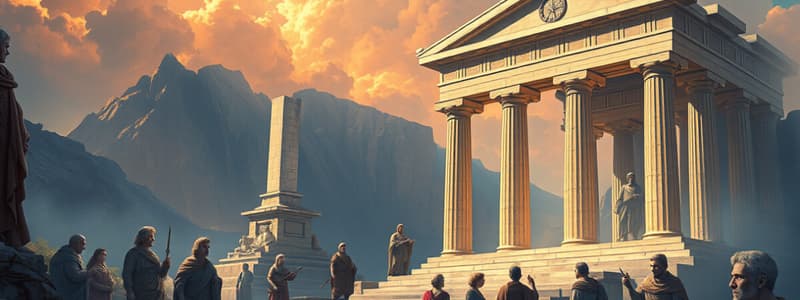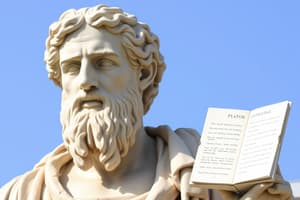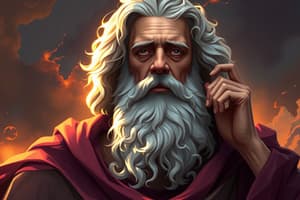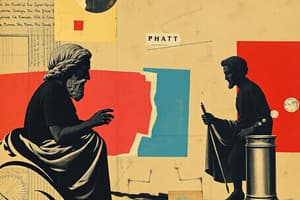Podcast
Questions and Answers
What was Plato's main concern regarding art in relation to society?
What was Plato's main concern regarding art in relation to society?
- Art should only depict the struggles of the artist's life.
- Art was not significant in the context of education.
- Art could corrupt the moral and ethical development of citizens. (correct)
- Art has the potential to positively influence moral values.
How did Socrates influence Plato's philosophical ideas?
How did Socrates influence Plato's philosophical ideas?
- Socrates focused solely on the practical aspects of governance.
- Socrates encouraged Plato to dismiss the importance of education.
- Socrates' teachings inspired Plato to explore the connection between virtue and politics. (correct)
- Socrates believed that art was the ultimate path to wisdom.
What role did Plato believe education played in society?
What role did Plato believe education played in society?
- Education was crucial in developing virtues and character traits aligned with justice. (correct)
- Education served to maintain the status quo of social hierarchy.
- Education was primarily about acquiring wealth.
- Education focused on historical narratives rather than moral development.
What aspect of the political context in Ancient Athens influenced Plato's thoughts?
What aspect of the political context in Ancient Athens influenced Plato's thoughts?
In what way did Plato propose to critique educators in his philosophical vision?
In what way did Plato propose to critique educators in his philosophical vision?
What was Plato's primary critique of Athenian democracy during his time?
What was Plato's primary critique of Athenian democracy during his time?
In Plato's depiction of a 'diseased city,' what role does Socrates serve?
In Plato's depiction of a 'diseased city,' what role does Socrates serve?
What does Plato suggest about the influence of art on society?
What does Plato suggest about the influence of art on society?
How does Plato connect education to virtue in his philosophy?
How does Plato connect education to virtue in his philosophy?
What historical event significantly influenced Plato's writings on the political context of Athens?
What historical event significantly influenced Plato's writings on the political context of Athens?
Flashcards are hidden until you start studying
Study Notes
Plato and His Philosophical Influence
- Founder of the Platonist school of thought and the Academy, marking the first institution of higher learning in the Western world.
- Critiqued Athenian democracy, especially during the tumultuous period of the Peloponnesian War (431-405 B.C.E.).
- Utilized the concept of a "diseased city" in dialogues to illustrate Athens' political failures.
- Socrates, as a fictional character, attempts to propose solutions to the problems in this imagined city, paralleling the issues in Athens.
Political and Social Context of Athens
- The Peloponnesian War shifted power from Athens to Sparta, resulting in the temporary downfall of Athenian democracy.
- Athenian defeat is seen as a failure of democracy by many critics, including Plato.
Criticism of Athenian Culture
- "Republic" critically evaluates Athenian poets and their storytelling, questioning their impact on society.
- Focus on the influence of art, education, and their roles in shaping the virtues and moral character of individuals.
Art and Education in Plato’s Philosophy
- Plato believed art and mythologies could shape societal beliefs and moral values, holding the potential to corrupt citizens.
- Advocated for an educational system designed to cultivate virtuous and morally excellent citizens in his ideal society.
Connection Between Art and Politics
- Art perceived as a tool with influence over political ideologies and actions.
- Addressing art’s role in "Republic" reflects Plato’s concern for its impact on the political life of city-states, emphasizing alignment with justice and societal ideals.
Philosophical Context in Plato's Era
- Celebrated disciple of Socrates, amidst a decline in artistic glory, with a rising focus on philosophy and oratory.
- Moral values in society were perceived to be declining, leading philosophers to explore the reasons behind this moral decay.
Types of Literary Criticism
- Historical-biographical criticism assesses literature in the context of the author's background, linking significance to historical events.
- Moral-philosophical criticism evaluates literature based on ethical considerations reflected in the text.
- Sociological criticism examines literature concerning societal factors, including the author’s influence within that society.
- Marxist criticism focuses on literature’s response to class oppression.
- Psychoanalytic criticism investigates the psychological motivations of characters and the unconscious thoughts of authors as expressed in their works.
Aristophanes and the Evolution of Literary Critique
- Aristophanes, an early literary critic, discusses in "The Frogs" the merits of Aeschylus and Euripides.
- His work highlights the importance of craftsmanship, morality, and language selection in artistic expression.
Studying That Suits You
Use AI to generate personalized quizzes and flashcards to suit your learning preferences.




